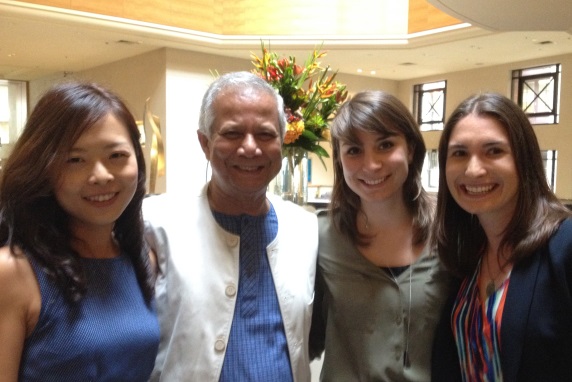Green Tea And Honey With Muhammad Yunus
If you’re passionate about ending poverty, then you might have heard of Professor Muhammad Yunus. He is the founder of the Grameen Bank, recipient of the 2006 Nobel Peace Prize and the 1998 Sydney Peace Prize. But more importantly, he is a pioneer of microfinance who is now helping over seven million Bangladeshi women leave poverty behind with small loans.
When I was given the chance to meet him over a coffee (or, green tea with honey, to be precise), it was an opportunity I couldn’t turn down. So on Professor Yunus’ recent visit to Sydney, several members of the Sydney Peace Foundation and myself had the chance to chat to one of the world’s most inspiring social entrepreneurs.
What did I learn over green tea and honey with Professor Yunus?

1. Solving a problem as big as poverty requires us to think about charity differently.
In his book Banker to the Poor, Yunus says:
When we want to help the poor, we usually offer them charity…But charity is no solution to poverty. Charity only perpetuates poverty by taking the initiative away from the poor. Charity allows us to go ahead with our own lives without worrying about the lives of the poor.”
Small loans are a business solution to ending poverty that change the way we think about charity. In many ways, it would be easier to just give someone living in poverty $100 as a gift, but what happens when that money runs out? With a loan, the impact can be intergenerational.
2. We must look at people living in poverty as people first, poor second.
In the 2003 Commonwealth Lecture, Yunus said:
The poor themselves can create a poverty-free world. All we have to do is to free them from the chains that we have put around them!”
On my travels with Opportunity in India, I have been welcomed into the homes and businesses of creative, resourceful, generous, hard-working mothers who have far more business nous than the average person. They are poor because they have been born into a system that fails them. A small loan is one way we can begin to shift the system in their favour.
3. Ending poverty is possible.
At 74-years-old, Professor Yunus has seen a lot of change in his lifetime, both in his home country of Bangladesh and around the world. He remains an optimist, convinced that human ingenuity and compassion can bring about the end of poverty, if we all do our part.
At Opportunity International Australia, Jessica Carter is the Proposal and Program Coordinator, helping to support and communicate about our innovative programs in India, Indonesia, The Philippines, China and Ghana.